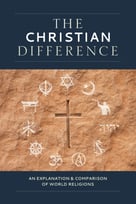In our pluralistic society and world, there is a wide variety of cultures, beliefs, and religions. And with that comes a variety of questions that Christian educators, like you and me, often face! Over the next few months, I will be sharing a series of blogs on teaching the difference between Lutheran Christianity and other religions.
No One Can Serve Two Masters
From 1996 to 1999, I served as a short-term missionary in The Lutheran Church—Missouri Synod (LCMS) through a program called Volunteer Youth Ministry (VYM). Following six months of language and culture training, I was assigned to teach English at Concordia Middle School in Chia Yi. In addition to this daily teaching, our mission team also hosted an English Bible study every Friday night at the VYM office. Taiwanese youth, eager to learn and practice English, would attend this event, which featured Christian songs, Bible study, and fellowship, all in English. During the first year we hosted the Bible study, we were excited and encouraged to witness how quickly and readily youth would embrace Jesus Christ and the message of salvation through His death and resurrection. However, we found it surprising that many of the students had not renounced their preexisting Buddhist, Taoist, or Confucian beliefs or ancestor worship but had simply added Jesus in.
No doubt the devil, the world, and the sinful nature were working against them, but perhaps it was also a failure on our part. As someone brought up in the LCMS, I was taught, among other things, that God is three persons—Father, Son, and Holy Spirit—but is also one. I knew innately Christianity is a monotheistic faith, meaning not only that God is one but also that He is a jealous god, sharing His glory with no other. Consequently, Christians may have no other god in addition to Him. Perhaps as a ministry team, we assumed that our students would naturally renounce all they had previously believed and embrace the one, true God wholeheartedly and without division. Once we realized the problem, we addressed it. It served as a powerful lesson on the importance of understanding other religions and how they overlap and differ from our own.
Not Just in the Mission Field
The anecdote above is not offered to suggest that such challenges (we might call them opportunities) only take place in the mission field. Far from it. Consider the reality of teaching in the contemporary Lutheran day school or preschool. I was raised in the LCMS school system back in the late seventies and early half of the eighties. At that time and place, there was a more intimate relationship between the congregation and school in the sense that most students in the school came from families in the church. Almost all of those who didn’t came from partner LCMS churches. In this context, teachers could reasonably assume that students were on the same page theologically. That is to say, the average student was baptized and raised in an LCMS church, hearing the same teaching in worship and Sunday School week after week.
Such is not the case today. All three of the churches I have served as a pastor have day schools and preschools, and in each, roughly fifty percent of the student body has its origin outside the congregation. In one sense, this is an excellent opportunity for outreach. However, the reality for the day school and preschool teacher is that students raised outside the LCMS system not only lack training in Lutheran theology but also bring whatever potentially false theology may be in its place. LCMS teachers, especially in the present day, need a thorough and acute understanding of Lutheran theology. What is more, given that students may come from faith backgrounds outside of Christianity, there is excellent value in having at least a cursory understanding of other popular world religions.
A Wide Umbrella of Belief
There is a similar application for Lutherans teaching outside the day school or preschool. Consider Sunday School and confirmation instruction. While it seems less likely that one would encounter students still espousing the beliefs of non-Christian religions in either of these settings, the need for a clear understanding of the Lutheran faith still exists. One reason is popular Christian music. As long as there has been Christian music, there have been hymns and songs which present false theology. The church has guarded against this for centuries. It would be fair to say that in the last half-century, popular Christian music has proliferated, in part due to the development of contemporary worship. While much of this music has been a blessing to the church, some contain false theology which plagues Christians worldwide. What is especially pernicious about this problem is that many Christians, even Lutherans, are ready to accept as biblical truth any song which is labeled Christian. Sunday School and confirmation teachers and, in truth, any Lutheran teacher need to be aware that students may be coming to class after a week of listening to “Christian” music that presents ideas counter to the tenets Lutheran education. This point is intended not to vilify any but to keep in mind that extraordinarily little of any popular Christian music which one might hear on the radio is written by LCMS Lutherans who have the training and intent to remain lyrically faithful to Lutheran theology.
Be Informed
As Lutheran teachers, both lay and professional, face challenges like those conveyed above, keep in mind that we are in good company. In the Old Testament, Daniel had to remain true to the one, true God during his deportation to Babylon. Likely he grew to understand the religions of Babylon. In the New Testament, Paul grew in the knowledge of the pagan religions belonging to the Gentiles with whom he worked.
God is faithful. He will equip His church. In an effort to assist Lutheran teachers of all kinds, several monthly blogs will follow this one to highlight the basics of world religions, along with strategies and encouragement on teaching how they differ from Christianity.
 The Christian Difference details the basic history, personalities, and beliefs of the world’s major religions, written to give common ground for you to share your faith in Jesus Christ.
The Christian Difference details the basic history, personalities, and beliefs of the world’s major religions, written to give common ground for you to share your faith in Jesus Christ.












